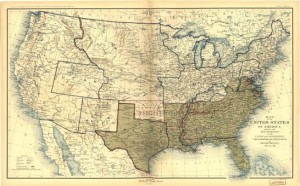 A new Senate bill for reconstructing the South passes the House and Senate today, its origins hearkening back to a February 1863 plan proposed by U.S. Senator from New York, and prominent Baptist layman, Ira Harris. The plan as passed is based on presupposition that the Southern states would need to “re-join” the Union in order to effect reconstruction. The position of U.S. President Abraham Lincoln, on the other hand, is that the rebellious states were not constitutionally allowed to leave the Union, and therefore legally remained a part of the United States. In Lincoln’s view, appropriate restitution for the treason committed by a majority of voting citizens in the eleven Confederate states would require fulfillment of certain conditions in order to have full Union rights restored to citizens and states alike. In addition, today’s bill bans slavery prematurely, as a Constitutional amendment — already being debated — will be needed in order to effect a nationwide ban on the practice.
A new Senate bill for reconstructing the South passes the House and Senate today, its origins hearkening back to a February 1863 plan proposed by U.S. Senator from New York, and prominent Baptist layman, Ira Harris. The plan as passed is based on presupposition that the Southern states would need to “re-join” the Union in order to effect reconstruction. The position of U.S. President Abraham Lincoln, on the other hand, is that the rebellious states were not constitutionally allowed to leave the Union, and therefore legally remained a part of the United States. In Lincoln’s view, appropriate restitution for the treason committed by a majority of voting citizens in the eleven Confederate states would require fulfillment of certain conditions in order to have full Union rights restored to citizens and states alike. In addition, today’s bill bans slavery prematurely, as a Constitutional amendment — already being debated — will be needed in order to effect a nationwide ban on the practice.
Lincoln declines to sign today’s Southern Reconstruction bill into action, allowing it to expire when Congress adjourns. On the other hand, the president today signs the Railroad Act of 1864, legislation designed to assist the railroads in laying rails in the West. The Act consists of additional land grants and bonds.
While the U.S. Senate debates Reconstruction strategies and Lincoln continues his efforts to develop the American West, in the Confederacy M. T. Sumner, Corresponding Secretary of the Southern Baptist Domestic Board of Missions, pens a missive that will be published in the upcoming edition of the North Carolina Biblical Recorder. His subject is Petersburg, Virginia, a critical supply route to the Confederate capital of Richmond, via railroad.
This gallant city, now besieged by our common enemy, has been the theatre of missionary operations for many years. The Domestic Board has aided the Mission Baptist church (2nd church) here from its origin in the support of its pastors. All have successively shared in its beneficence. The present occupant of the pastorate, Rev. Thomas Hume, is a faithful and successful Missionary of the Board. He is doing an important work among the soldiers, as well as in his own congregation. Here, too, the Board is sustaining, in part, Rev. Wm. M. Young, post chaplain, by supplementing his salary from the government. Bro. Y. is an earnest and able preacher, long and favorably known in Virginia as pastor of the church in Williamsburg, previous to the breaking out of the war. Rev. J. L. Trueman is also laboring at this point, as Missionary of the Board to the soldiers. He is authorized to collect funds for the objects of the Board. Perhaps three more useful men can not be found in any place. The whole Confederacy is dotted with the labours of this Board, and not a division of the army but shares in its attention and care. Many a wounded and sick soldier is comforted by the presence of the Missionary who holds his commission from the Domestic Board of Baptist Missions. It is a noble enterprize, and shares largely in the Divine blessing. To God be all the praise. The expenses of this post alone to the Board are five thousand and two hundred dollars per annum, not including the cost of religious literature circulated liberally by our Missionaries among the soldiers.
We hope these facts alone will convince the brethren that the Board can not long exist without a constant supply of means.
Much more than missionary efforts are in danger in Petersburg. Should the Union capture the city, Richmond would soon fall as well, effectively sealing the Confederacy’s doom.
Sources: Wade-Davis Bill (link); “The Railroad Act of 1864” (link); “Petersburg, Va.”, Biblical Recorder, July 6, 1864 (link)


